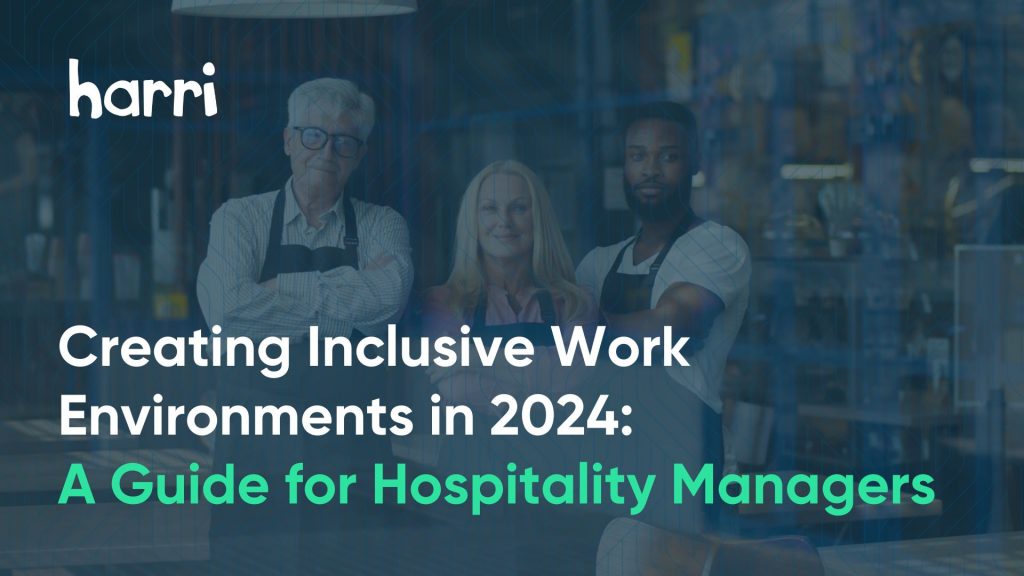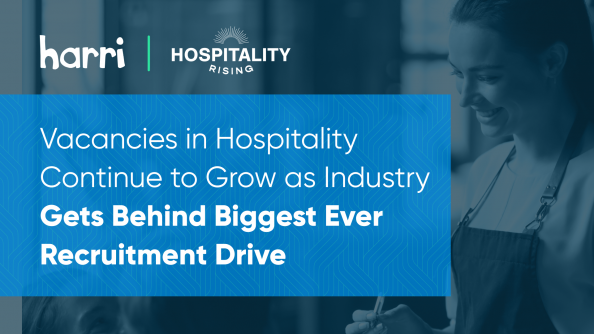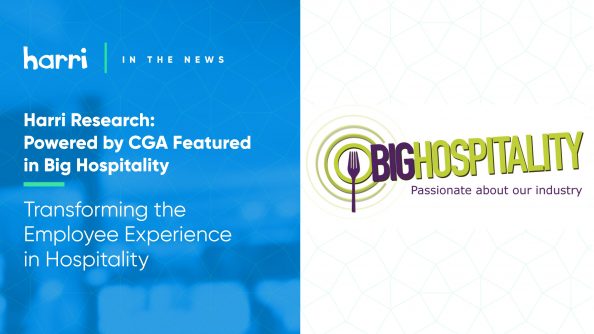Creating Inclusive Work Environments in 2024: A Guide for Hospitality Managers

- By Harri Insider Team | March 19, 2024
In the diverse and dynamic world of hospitality, creating an inclusive work environment is not just a moral imperative but a strategic necessity. Hospitality, with its varied clientele and workforce, demands a workplace that not only recognizes diversity but actively celebrates and fosters it.
An inclusive environment enhances the employee experience and resonates positively with customers, contributing significantly to a business’s success and reputation. Inclusivity in the workplace leads to a host of benefits, including improved innovation, better customer service, and heightened employee morale and productivity.
In this guide, we aim to empower managers and hospitality operators with the knowledge they need to create a welcoming workplace for all.
Understanding the Challenges of Creating an Inclusive Work Environment
Creating an inclusive environment in hospitality, especially for frontline employees like waitstaff and front desk operatives, is fraught with challenges. These challenges can range from bridging cultural differences and language barriers to accommodating varying communication styles.
As your team begins to formulate strategies to address some of these challenges, begin by expanding your definition of “diversity and inclusion” to encompass all aspects of your employee’s physical, mental and emotional well-being. For instance, behavioral scientist, Dr. Pragya Agarrwal highlights the importance of considering physical comfort, such as creating spaces with suitable acoustics and safety features like flooring with good grip, to foster an inclusive environment.
Additionally, for businesses hiring employees who speak English as a second language, communication issues can arise, impeding the creation of a truly inclusive environment. Businesses overcoming these challenges through initiatives like language training programs and clear communication strategies have seen significant improvements in team morale and work quality.
Overall, while all of these challenges are certainly real, none are insurmountable with the right team in place and dedication to get it right. Let’s examine some of the most effective strategies to start with.

Strategies for Fostering Inclusivity
To successfully foster inclusivity, hospitality managers can adopt several practical strategies. Let’s examine some of the most effective best practices to start with.
Promote Cultural Intelligence
An inclusive environment means going beyond mere awareness of cultural differences. It involves equipping teams with the skills to function effectively across various cultural landscapes. Training programs enhancing cultural intelligence at all levels of the workforce are crucial. Understanding cultural norms and values and adapting feedback and communication methods accordingly are essential components of cultural intelligence. Promoting these values can take the following forms:
- Training Programs: Implement comprehensive cultural sensitivity training programs. These should cover topics like understanding different cultural norms, values, body language, and communication styles.
- Interactive Workshops: Organize interactive workshops where employees can learn about different cultures through activities, role-playing, and discussions.
- Language Skills: Encourage and facilitate language learning opportunities for employees to help them communicate more effectively with colleagues and customers from diverse backgrounds.
- Cultural Celebrations: Host and encourage participation in cultural celebrations to foster appreciation and understanding of different cultures within the workforce.
Adopt Flexible Leadership Styles
Inclusive leadership requires flexibility to cater to the diverse motivations, preferences, and work styles of a multi-generational and multicultural workforce. For example, while the ‘boomer’ generation may prioritize job security, millennials and Gen Z employees might value work-life balance more. Understanding and accommodating these differences is key to inclusive leadership.
- Personalized Management: Train managers to tailor their approach based on individual team members’ needs and preferences. This could mean varying communication styles, feedback methods, and motivational strategies.
- Generational Understanding: Offer training on generational differences in the workplace to help leaders effectively manage and engage with employees of all ages.
- Employee Empowerment: Encourage leaders to empower employees by involving them in decision-making processes and providing opportunities for growth and development.
Create Platforms for Dialogue and Feedback
Establishing channels for open communication where employees can share experiences and provide feedback is vital. This can be achieved through regular meetings, suggestion boxes, and inclusive team-building activities. Such platforms can provide insights into potential issues and foster innovative solutions that might be overlooked in a more homogenous group.
The Role of Hospitality Management Systems
Technology can play a pivotal role in enhancing workplace inclusivity, particularly hospitality management systems like Harri. These systems can facilitate inclusivity from recruitment to daily operations. They offer tools for employee feedback, performance tracking, and customized communication, aiding in creating a more inclusive work environment.
Harri Engage is the all-in-one solution for communicating with your workforce. By offering a platform that allows for regular, real-time engagement with employees, it encourages a workplace culture where every team member feels valued and heard. For instance, the ability to ask quick questions when employees clock in ensures a 100% response rate, creating an inclusive environment where every voice matters. This feature is particularly beneficial in recognizing and addressing the unique needs and experiences of all employees.
Furthermore, the platform’s capability to celebrate special milestones in both work and life, powered through automation, ensures that every employee’s achievements are acknowledged and celebrated.
Harri Engage offers full integration with Harri IQ and its AI-driven analytics play a crucial role in identifying and understanding diversity trends within the organization. By tracking employee touchpoints, performance, and personal milestones, the platform offers actionable insights that help intercept turnover risks, which can disproportionately affect minority groups. This proactive approach in retention, particularly during the critical first 90 days, ensures that new starters, regardless of their background, receive the support they need to succeed.

The Benefits of a Diverse and Inclusive Workforce
The benefits of a diverse and inclusive workforce are manifold. Studies have shown a direct correlation between diversity and improved financial performance. Inclusive workplaces drive creativity, innovation, and productivity. They are also better positioned to understand and cater to a diverse customer base, ultimately enhancing the overall customer experience.
In addition, incorporating diversity into the ethos of your company’s brand is an excellent way to broaden your pool of both potential customers and future job candidates.
The Role of Leadership in Fostering Inclusivity
Leaders set the tone for the organizational culture and their actions, and attitudes significantly influence the success of inclusivity initiatives. Effective leadership in this context involves more than just endorsing policies; it requires active, visible commitment to inclusivity principles.
Leaders must lead by example, demonstrating inclusivity in their daily interactions and decision-making processes. This means going beyond mere compliance with diversity policies and actively seeking out and valuing diverse perspectives within their teams. By doing so, leaders create an environment where all employees feel valued and respected, which in turn encourages them to contribute their best.
Furthermore, leaders play a crucial role in ensuring that inclusivity initiatives are not just temporary campaigns but are integrated into the core values and everyday practices of the organization. This involves regularly communicating the importance of inclusivity, setting clear expectations for inclusive behavior, and holding themselves and others accountable for upholding these standards.
HR departments, in particular, have a pivotal role in this process. They are instrumental in designing and implementing training programs that educate employees about diversity and inclusion, and in creating systems that support and reinforce inclusive practices. HR can also provide valuable guidance and support to managers and team leaders, helping them to navigate the challenges of managing a diverse workforce and to recognize and address any unconscious biases that may exist.
Incorporating Inclusivity in Marketing and Branding
Inclusivity in the workplace extends beyond internal practices and should be reflected in a company’s marketing and branding strategies. This approach not only strengthens the brand’s identity but also resonates with a broader, more diverse audience, attracting both new hires and customers.
Incorporating inclusivity into marketing involves showcasing the diversity of the workforce and the inclusive nature of the workplace in promotional materials. This can be achieved through diverse representation in imagery and narratives that reflect the varied backgrounds and experiences of employees. By doing so, companies send a powerful message that they value and celebrate diversity, which can be highly attractive to potential employees who are seeking inclusive workplaces.
Harri’s talent attraction tools help bring the spirit of employer brands to life with our career branding pages. Employers can advertise open roles in a custom format, alongside centralized information regarding, organizational values, culture and employee testimonials. This not only drives excitement at the start of the candidate journey, but can also create a competitive advantage for businesses, in offering a distinct view into their Employee Value Proposition (EVP).
In terms of branding, inclusivity should be positioned as a key component of the company’s identity and values. This involves more than just surface-level changes; it requires a genuine commitment to inclusivity, which should be evident in every aspect of the brand’s messaging. This can include highlighting the company’s commitment to diversity in mission statements, marketing campaigns, and customer communications.
Moreover, inclusive marketing and branding strategies can help companies to connect with a diverse customer base. By demonstrating an understanding and appreciation of different cultures and perspectives, companies can create more meaningful and authentic connections with their customers. This not only enhances the customer experience but can also lead to increased customer loyalty and brand advocacy.
Building a Future on Inclusivity with Harri
Fostering an inclusive work environment in the hospitality industry is a journey that requires commitment, strategic planning, and the effective use of management systems. By embracing cultural intelligence, adopting flexible leadership styles, and creating open platforms for dialogue, hospitality managers can turn the challenges of workforce diversity into opportunities for growth, innovation, and unparalleled service delivery. Embracing inclusivity is not just about doing the right thing; it’s about building a sustainable, successful future in the hospitality industry.
To learn more about how Harri’s suite of hospitality-focused tools, including career branding and Harri Engage, can empower your business’s diversity and inclusion initiatives, request a demo with our team today.





















